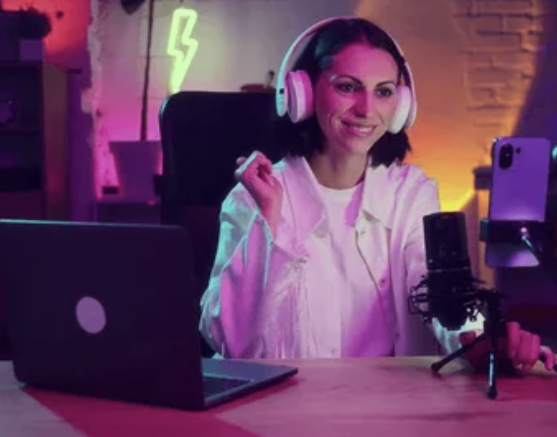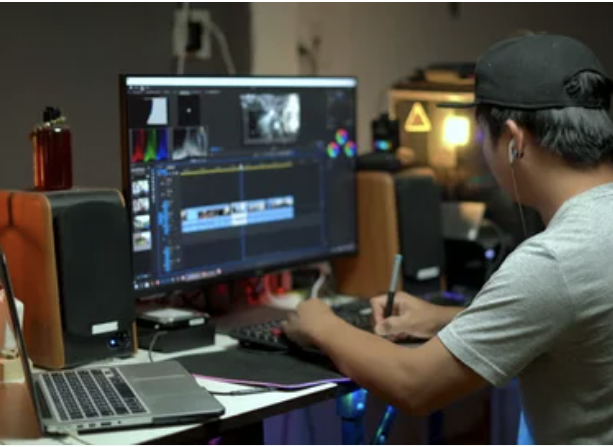This three-year program equips you with the creative and technical skills necessary to thrive in the rapidly expanding new media landscape. You will explore the theoretical underpinnings of new media, develop expertise in content creation and distribution, and gain an understanding of the business and ethical considerations within the industry. This degree offers students a comprehensive curriculum with hands-on learning, and instruction from real professionals in the field. At only a fraction of the cost of the average Bachelor's degree, graduates will leave this program with the skills and confidence to earn money and begin their careers in a diverse range of fields within New Media, monetization, and communication.
Embrace the future of communication.
Enroll in the Bachelor of Arts Degree in New Media Studies at Virtual Film School today!
3-YEAR B.A. NEW MEDIA COURSES
|
Fundamentals of New Media (6 Units)
Nowadays, just about everyone wants to become a YouTube star. But there are over 500 hours of video uploaded to YouTube every minute, so how can you possibly get discovered? Here’s how. This class details how to make videos and video series that generate so much excitement, your bodyguard will need a bodyguard. From brainstorming cool concepts to building your personal brand and cashing in on paid production and distribution opportunities, learn how NOT to get lost in the vast wasteland of crap that gets uploaded to YouTube every minute. Introduction to Virtual Production (OPTIONAL) (6 Units) Learn in-demand skills in this expert-led course in After Effects and Motion Graphics. Build your motion confidence on both 2D and 3D animation, compositing and effects software like After Effects, Photoshop, Illustrator, CDs Max and Cinema 4D. Master conceptualization, assessment, formulation, cultivation, storyboards, animatics and green screen techniques, applying storytelling and film theories to your final project. Acting Fundamentals for New Media (6 Units) Are you outgoing? Do you sometimes like to tell stories or pretend you’re someone else? Maybe you’ve thought about trying acting? Well, here’s your chance! In this class, you’ll learn from top Hollywood talent the basics of how to act, perform, and maybe even become a digital star! Discover how to express yourself individually and how to work as a web-team, gaining valuable leadership skills while having fun and making friends. Learn how to create engaging, compelling characters, and make every role shareworthy. New Media ideography, Lighting and Sound Techniques (6 Units) If you own a mobile phone, you already have the gear to make videos. But if you want to make videos like the pros do, you’ll need the mad-skills like the pros have, which no amount of fancy gear can make up for. Video-making is an art, and art takes practice. In this class, you’ll practice framing and composition, picture enhancement, shot technique, coverage, sound, lighting, and how to bring your ideas to life and capture the spectacular. New Media Writing I: Writing a Digital Series Pilot (6 Units) At traditional media film schools, they teach the history of 20th Century filmmaking. At Virtual Film School, we teach the history of 21st Century digital content creation, because if you know the success stories of social media history, you’re bound to repeat it. Ever wonder why the Grumpy Cat meme earned $100 million dollars, book and merchandising deals, and even a Lifetime movie? Now you can learn how to create content that’s relevant and trending in a digitally dominated social landscape. New Media Writing II: Writing a Digital Series (6 Units) The web shows that win all the awards and cash are the best written. Period. But you have to be a mega-genius to write a hit digital series, right? Wrong. All you have to do is work at it. But you have to work in the right direction. Otherwise, you’re just spinning your wheels like a caffeinated hamster. Learn how to play to the strengths of the small screen and create series of concepts that work for the Web. In this master class, you’ll create a web series pitch bible, a; business plan, a pilot script, and the first three episodes of your webisode series. Online Video Directing (6 Units) Are you inspired by famous Hollywood directors like Steven Spielberg or Freddie Wong? Do you like telling people what to do? What to say? And how to say it? Then you just might be a director (or a jerk, but let’s just go with the director for now). In this awe-inspiring class, you’ll learn the art of visual storytelling, how to create a shot list and storyboards, how to work with producers, casting directors, actors, production designers and cinematographers, while gaining confidence and leadership skills. Online Video Pre-Production (6 Units) You’ve got a great concept. You’ve got a great script. But if you want to save time and money, preproduction is best done before the shoot. This valuable class demystifies scheduling and budgeting, prop shopping, location scouting, greenscreen and set construction, call sheets, clearances, permissions and more and shows you how to pull it all together before the director first calls action. Online Video Production: Producing and Shooting a Digital Series (6 Units) The web shows that win all the awards and cash are the best written. Period. But you have to be a mega-genius to write a hit digital series, right? Wrong. All you have to do is work at it. But you have to work in the right direction. Otherwise, you’re just spinning your wheels like a caffeinated hamster. Learn how to play to the strengths of the small screen and create series of concepts that work for the Web. In this master class, you’ll create a web series pitch bible, a; business plan, a pilot script, and the first three episodes of your webisode series. Online Video Editing (6 Units) Congratulations! You produced a digital series. Now it’s time to start editing (aka, the process of turning a bunch of un-matching, spottily lit, badly framed shots into shareworthy content). Audio Post-Production for Online Video (6 Units) Learn editing theory and techniques, how to export video, audio editing, titles and color correction, the art of the trailer, and edit your own project as well as your classmate’s work. If your video sounds good, it is good. Learn from top Hollywood producers the basics of sound design and how to sound like a pro -- even on a bubblegum and shoestring budget. ----------------BREAK---------------- Brand Development: Theory and Practice (6 Units) Back in the 20th Century, you had to be Rockefeller-rich to build a personal brand. Nowadays, anyone with a snappy idea and clever no-budget execution can attract an audience of millions. In this extraordinary class, you’ll learn how to build, implement and present a personal brand in the digital age. Digital Marketing (6 Units) This digital marketing introduction shows you what’s what and how to make your personal brand go viral. What does a solid digital marketing strategy look like? Discover how to define and understand your audience and the relevant digital social marketing platforms to launch on. Learn how to conquer the field and measure success. Introduction to Social Media Deployment with an Emphasis on Youtube (6 Units) Alternative Social Media Deployment: Linkedin, Twitter, Instagram, TikTok (6 Units) New Media Monetization in the Creator Economy: How Content Creators Get Rich (6 Units) This New Media monetization intensive takes digital marketing to the next level with a study of social media success and fail stories and helps you successfully launch your personal brand on the ten most popular social sharing sites in the world and measure monetization. Introduction to New Media Business (6 Units) Have you ever dreamed of starting your own 21st Century startup or a digital movie studio specializing in original web video content? Now you can learn how to create, validate, and pitch a business startup idea, develop a million-dollar business plan, crowdfund a startup idea, and even master the art of IRL networking to build buzz and attract seed money. Final Captstone Project (60 Units) The capstone course is the final course in the VFS curriculum. Students are expected to create their own internet-based series of at least 6 episodes. This project could be a new web series, a series of pics, a website dedicated to a specific topic, a citizen journalism project – it’s the student’s choice, but the student must receive approval from the instructor to begin. The capstone course meets twice a week for 2 months and will be largely directed study with the instructor acting as a mentor and “Executive Producer.” By the end of the capstone course, students will have completed and posted a web-based series with a plan for monetization in place. beyond! |
Elective Courses (Choose A Minimum of 3 Courses)
Website and App Development Fundamentals (8 Units)
If you don’t have a website in today’s digital economy, your personal brand doesn’t exist. But how do you build a website if you don’t know how to code? No worries – no coding required for this easy-peasy, hands-on workshop that demystifies website building, search engine optimization, and even shows you how to build a million-dollar APP from idea to execution to monetization and beyond! Vlogs and Live Video (8 Units) Let’s say you’re so broke that your computer is made out of bamboo and it’s powered by a rat on a treadmill. So long as it has a webcam, you can launch a video blog. Video blogs are the easiest and cheapest way of presenting content. But the vlogosphere is very crowded, so it’s essential to make your vlogs stand out. This vlog intensive covers vlog genres like gaming, history, technique, and helps you write and shoot clever content that grabs eyeballs and goes viral. Introduction to Virtual Production, After Effects, and Motion Graphics (8 Units) Learn in-demand skills in this expert-led course in After Effects and Motion Graphics. Build your motion confidence on both 2D and 3D animation, compositing and effects software like After Effects, Photoshop, Illustrator, CDs Max and Cinema 4D. Master conceptualization, assessment, formulation, cultivation, storyboards, animatics and green screen techniques, applying storytelling and film theories to your final project. Digital Media Journalism (8 Units) Do you like to report facts and news that is largely ignored by large media companies? Do you use social media to tell your friends what’s going on in your community or to share current events around you? Take your social sharing to the next level and become a bonafide digital media journalist and a voice for the voiceless in this master class. Learn laws and ethics, how to increase rankings in search, and how to use self-promotion in an increasingly crowded digital space with an ever-shrinking news cycle. VR/AR Storytelling and Production (8 Units) Our brains are hardwired to see the narrative. That's what makes the potential of VR and AR for content creation so exciting. This is the ultimate introduction to virtual reality storytelling and production. Discover the freedom of this exciting new medium and create simulated environments or a magical alternate universe using cutting edge, immersive technologies. Podcasting (8 Units) How to create, produce, distribute and monetize a Podcast. |




